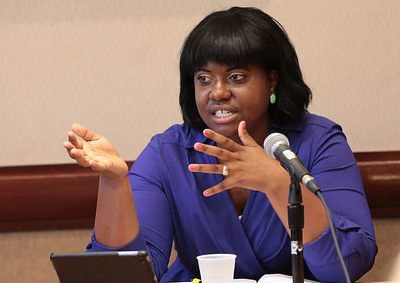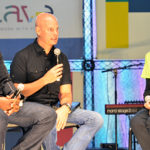DALLAS—The time for merely praying about racial injustice is past, a roomful of participants at the Cooperative Baptist Fellowship general assembly agreed. They called for action.
The mixed-race group participated in “Let Justice Roll Down: Learning from the African-American Experience,” a seminar held during the CBF assembly.
 Kathryn Freeman, director of public policy for the Texas Baptist Christian Life Commission.They discussed racism on the 150th anniversary of Juneteenth, the day U.S. troops enforced the Emancipation Proclamation in Texas. They also lamented injustice less than 48 hours after a gunman slaughtered nine members of Emanuel African Methodist Episcopal Church, a historic African-American congregation in Charleston, S.C.
Kathryn Freeman, director of public policy for the Texas Baptist Christian Life Commission.They discussed racism on the 150th anniversary of Juneteenth, the day U.S. troops enforced the Emancipation Proclamation in Texas. They also lamented injustice less than 48 hours after a gunman slaughtered nine members of Emanuel African Methodist Episcopal Church, a historic African-American congregation in Charleston, S.C.
Asked what U.S. Christians should do about the Charleston slaying, co-presenter Kathryn Freeman called for overt action to overcome racism.
“Prayer is important, but it can’t be all you do,” said Freeman, director of public policy for the Texas Baptist Christian Life Commission. “The time for (simply) listening and mourning and prayer is over. We need to act.”
‘The church can’t wait’
“The church can’t wait,” she said, debunking the notion racism will die out with the older generation of Americans by pointing to the youth of the accused Charleston killer, Dylann Roof. “This guy is 21. We can’t wait for old racists to pass off.”
Personal education is a significant step in fighting racism, Freeman noted.
“Start with your personal circle—make friends with African-Americans,” she explained. “Read books by nonwhite, non-Christian authors. Sit under a black pastor in a black church.”
Sign up for our weekly edition and get all our headlines in your inbox on Thursdays
Christians in McKinney provided an appropriate first response after a white police officer wrestled an unarmed 15-year-old black girl to the ground and pulled his gun on black boys, she said. “The churches came together (across racial lines) for a prayer vigil and to talk to the police together. That’s tangible.”
‘Pastor switches’
Freeman also called for “pastor switches”—with pastors of different races trading pulpits and “preaching sermons, but not necessarily about race.”
Lay people can follow that lead, she added, explaining: “Be inclusive. Invite people (of other races) to your church. Go to their churches.”
Also, Anglo-American Christians who want to combat race should reach out to the local chapter of the NAACP to “facilitate conversation” about what can be done, she said.
She urged Americans to oppose “redlining,” the banking practice that creates housing segregation by refusing to extend mortgages to prospective African-American homebuyers or limiting the number of mortgages available to them.
Christians concerned about injustice also should oppose voter-identification laws that effectively eliminate or reduce African-Americans’ ability to vote in local, state and federal elections, she added.
Time to get more specific
Co-presenter Ferrell Foster, director of ethics and justice for the Christian Life Commission, urged pastors to get specific on race.
“I wish more pastors would be really clear about race from the pulpit,” he said. “Pastors need to address issues of injustice. For example, admit something must be wrong with our criminal-justice system” which incarcerates young black males far out of proportion to their percentage of the population.
Members of the audience added to the list of suggestions for eradicating injustice.
“Until America acknowledges what they did visiting tragedy upon our black brothers and sisters and Native Americans, our recompense will spiral downward,” insisted Regina Hunt of Maumelle, Ark. “You cannot change what you will not acknowledge.”
Taking action
Beyond prayer vigils, Americans concerned about racial injustice should contact lawmakers and urge appropriate legislation, as well as boycott businesses that engage in unfair practices, Hunt said.
White Christians of goodwill can improve their relationships by paying attention to how they talk about race, seminar participants said.
For example, they discussed how using the hyphenated term “African-American” for blacks but only “Anglo” for whites implies America is for white people but not necessarily for blacks.
And well-meaning phrases such as “color-blind” sting, too, Freeman said.
“‘Color-blind’ is offensive,” she explained. “It says you don’t see me. It negates the history of African-Americans in America.”
“White folks, don’t brag about your ‘African-American friends,’” Foster advised. Friendship “is about relationships, not credentials.”
Despite good intentions of people who get together to foster racial understanding, Joy Williams of Little Rock, Ark., expressed doubt about progress.
“Blacks in America are terrorized 24 hours a day, seven days a week forever,” she said. “The systems in this country—economic, educational, judicial—were created by whites for whites. At the national level, we have to change the systems. There is no desire to do it, no will to do it, no plan to do it.”
















We seek to connect God’s story and God’s people around the world. To learn more about God’s story, click here.
Send comments and feedback to Eric Black, our editor. For comments to be published, please specify “letter to the editor.” Maximum length for publication is 300 words.